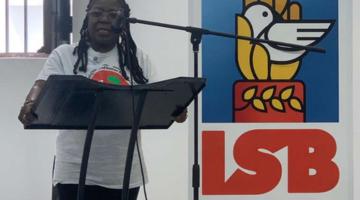Being in the wake, in the afterlives of slavery…is to be caught in the reverberating aftermath of a long disaster, a durational dance with danger, with terror.
“In the Wake is a dramaturgical analysis of Black life, both historical and contemporary.”
(Celebrating five years since the publication of Christina Sharpe’s book, In the Wake: On Blackness and Being, we asked four writers to offer a short meditation on what the book has meant to them. This week’s contributor is Troizel Carr. You can read the first meditation, by Jade Bentil, here, and the second meditation, by Imani Wadud, here.)
“…we must become undisciplined.”
“In other words, for Black academics to produce legible work in the academy often means adhering to research methods that are ‘drafted into the service of a larger destructive force,’ thereby doing violence to our own capacities to read, think, and imagine otherwise.”
If discipline is what we’re told to develop in order to ‘properly’ ride the bassline between theory and praxis, Sharpe tells us to discard the disciplinary impulse. Lose it. Crack its strict exoskeleton. Finger its fruit. Tongue its juices. Discipline keeps us imprisoned to manners of being, thinking, and sharing that preclude the drive to do some meaningful work together: the imperative work of staying alive, and multiplying, being fruitful. To become undisciplined gives us something else to do with our trembling hands, stiff from timeworn duty:wake work, intercession, care in precarity, the thing Black folx had been doing all along, standing in their gaps for all their others. We know how to weep and moan, say a prayer, shout a rant, make a joyful noise together, a rhapsody of mumbling words in concert, untranslated. A deafening, wailing sound comes from those who know the threat of discipline in captivity, its unwillingness to spare a merciless, unjust, and gruesome rod. But we continue to talk/sing/scream back, before it, surround it, drown it out with our noise. Our history is tribute to it. If we feel along the internal contours of intellectual discipline/disciplinarity, these outdated forms of dialogue and knowledge-gatekeeping, we could start to experiment with studied alternative ways of configuring the material world, so as to change our way of being in that world, modes of living that mechanisms of discipline would have us wring out in the wash of our imaginations. Sharpe’s In the Wake hopes to give us what Hortense Spillers has famously called “a praxis and a theory, a text for living and for dying, and a method for reading both through their diverse mediations.”[1]
“To become undisciplined gives us something else to do with our trembling hands, stiff from timeworn duty.”
Sharpe sets the scene. Wake work, care work, happens in the wake of the wake, of the ship, of the hold, of the weather. The brutal logics that each of these spatiotemporal locations share, as Sharpe explores individually in each chapter, are all historical and embedded, all present and mangled together. In hellish repetition, racial-gendered capitalism’s equation of abstract extraction, of forced movement, of violent individuation, of banishment from the fictional land of milk and honey, obliterates the possibility of life eternal for Black folx, a life unmolested, unwatched, unbothered, uncaptured, undead. Whether fleeing political unrest, battling the systems made for public good, or recovering from terrestrial disaster, Black folx are figured as the fodder of political economy, the chaff that must be collected and discarded on the threshing floor of the American neocolonial enterprise. The contemporary images in the book of global Black folx in crisis, in anguish, almost feels like too much to bear, too much to witness a life you already know. Yet, we bear it. We bear it some more. The repetitious nature of the text, the constant returning back to, is almost as if Sharpe asks us to begin again. To put aside our resident nihilisms, optimisms, and pessimisms, to begin to confront ourselves again (and again and again) with the material effects of antiblackness on those outside the Ivory Towers—the University, the Museum, the Foundation. She turns our attention back to those who might not ever have a chance to partake in the political games those white supremacist Towers ask us to play and those who might not have ever wanted to play them. We’re brought again and again to the little Black girls waiting for a(n institutional) care that might not come after cataclysmic disaster.
Antiblackness is the weather, uses the weather as its cover, a dense foggy surround that infiltrates our nostrils, seeps into our skin, blocks out the sun. It's a destructive maelstrom of a force that we cannot escape. That force is not exclusive to wrecking the life and lively rhythms of Black folx; it wrecks us all whether we know it or not. Racial-gendered slavery and its stammering re-reiterations—its descendant industries, politics, and infrastructures—ricochet through the history of Man to obstruct heaven on earth, especially for, but not only, for Black folx. But Sharpe, and the choral assortment of Black voices and thought she more than intentionally collects, find heavens in imaginations elsewheres and elsewhens. This is the theory of wake work.
“To be in the wake is also to recognize the ways that we are constituted through and by continued vulnerability to overwhelming force, though not only known to ourselves and to each other by that force.”
“In other words, even as we experienced, recognized, and lived subjection, we did not simply or only live in subjection and asthe subjected.”
According to Sharpe, to be in the wake is to be in the wake of death in the family, constantly present and waking every death of your nameless blackened kin abroad; the searing pain of a familial non-fiction. This presence lingers in the air even when you don’t check the news or scroll on Twitter. The rising toll overtakes you like a wave. You wake up in undertow. That toll recoils like a gun and penetrates and hollows out the affect of Black folxs’ every day, a spectacular racialized melancholia furrows and grooves behind what we're forced to call, rather mundanely, global Black life. Wake life—which must rightly be understood as, not only proximal, but co-constituted with social and corporeal death—is characterized as a position of “deep hurt and deep knowledge.” This position, of course, is a non-position, a false start, but it gives us tools for thinking and living in another awareness, another reality, for insisting on a queerly rigorous performance of study in every moment we can steal away. The stakes of the social and the political for Black folx is life opportunity; opportunity, in this case, is as local and quotidian as taking another breath, hearing another song, making some more love. This opportunity fills the lungs and the blood and the heart, regardless of who takes an office in an antiblack nation-state. It moves mountains. It does not have to take ‘mattering’ as its critical standpoint from which to project its ‘humanness,’ a neoliberal subjectivity, whose formation is reliant on antiblack death and dispossession; instead, it sees ‘mattering’—really being made of and with matter at all—as an opportunity to keep those Fanonian antennae out in the world, to keep sensing and refusing everything that would try to shut them out from the world of sensation and ecstatic pleasure. It causes those marked as ‘being’ anti-matter or non-matter to work together instead to establish economies and structures of care and transformation; this is the praxis of wake work.
"For, if we are lucky, we live in the knowledge that the wake has positioned us as no-citizen. If we are lucky, the knowledge of this positioning avails us particular ways of re/seeing, re/inhabiting, and re/imagining the world.”
“I am trying to find the language for this, find the form of this work.”
The wake takes on many forms, works at the level of form. Sharpe breaks open form and content as a sacrifice unto itself, teaches us to give ample mind to the definitional permutations of the word, so that all those internal resonances seem a little too on the mark. A little too mystical, too spooky not to be taken seriously. Being in the wake, in the afterlives of slavery, a term Sharpe borrows from Saidiya Hartman, is to be caught in the reverberating aftermath of a long disaster, a durational dance with danger, with terror. Black folx experience this numbing terror as a kind of everyday domesticity: to be in danger at home and abroad, to develop supernatural abilities to create home in conditions of peril, lack, and instability. To be barred from resources to sustain life. To be in the hold of a ship as economic product and/or as political refugee. To be cast into the sea and reduced to an aggregate number, no matter how many times your name gets said.
In all, In the Wake is a dramaturgical analysis of Black life, both historical and contemporary—it takes time to walk us through our own stage directions, indicate the ways that, even in our most pessimistic views, we refuse despondent hopelessness in the face of all hope being gone. That is its drama. If luck, or its dramatic counterpart Fate, has anything to do with being in the wake and its attendant labor for others, then understanding what it means to be no-citizen is the opening into another social, economic, and political structure already present, another way of staging the larger world around us, giving ourselves a new script, a new story ungendered. The form that Sharpe looks for is, like she says of Black being, “trans*form[ed].” The form of that wake work, care work, is a formlessness drafted together in tongues of fire, a blank spell book waiting for our magic. This is why she can’t find a form and hopes that she’s given it enough lift to fly to a somewhere else, wholly unimaginable, wholly unexpected, that we could begin to build here, form together, in the ruins of capitalism every day.
troizel d.l. carr (performance studies, phd candidate, NYU) is black and alive and that means more than these words can express. Currently a teaching fellow at the new museum of contemporary art (nyc), troizel's scholarship and performance practice places them somewhere at the cross-section of blackness, queer and transness, performance, protest, theology, and (popular) culture | troizel.com .
[1] See Hortense Spillers. "Mama's Baby, Papa's Maybe: An American Grammar Book" in Black, White, and In Color: Essays on American Literature and Culture. The University of Chicago Press, 2003.
COMMENTS?
Please join the conversation on Black Agenda Report's Facebook page at http://facebook.com/blackagendareport
Or, you can comment by emailing us at comments@blackagendareport.com



















